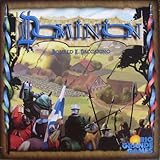Amulet
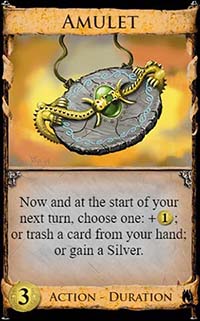
You choose something when you play it, and again at the start of your next turn; the choices may be the same or different.
Artificer
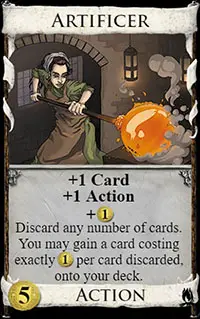
First you get +1 Card, +1 Action, and + . Then you discard any number of cards. You may choose not to discard any cards. Then you may gain a card costing exactly
. Then you discard any number of cards. You may choose not to discard any cards. Then you may gain a card costing exactly  per card discarded.
per card discarded.
For example if you discarded two cards; you may gain a card costing  ; if you discard no cards, you may gain a card costing
; if you discard no cards, you may gain a card costing  . The gained card comes from the Supply and is put on top of your deck. You may choose not to gain a card, even if you discard cards.
. The gained card comes from the Supply and is put on top of your deck. You may choose not to gain a card, even if you discard cards.
Bridge Troll
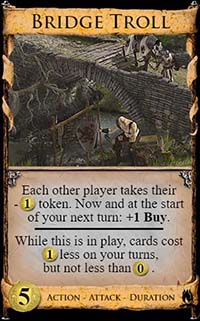
This gives each other player his - token, which will cause those players to get
token, which will cause those players to get  less the next time they get ; see the Tokens section. It also gives you +1 Buy both on the turn you play it and on your next turn.
less the next time they get ; see the Tokens section. It also gives you +1 Buy both on the turn you play it and on your next turn.
While Bridge Troll is in play, on your turns only, cards cost  less, but not less than
less, but not less than  . This applies to all cards everywhere, including cards in the Supply, cards in hand, and cards in Decks.
. This applies to all cards everywhere, including cards in the Supply, cards in hand, and cards in Decks.
For example if you have Bridge Troll in play and play Raze, trashing Estate, Estate will only cost  , so you'll only look at one card rather than two. This is cumulative; if you have two Bridge Trolls in play from last turn and play another Bridge Troll this turn, all cards will cost
, so you'll only look at one card rather than two. This is cumulative; if you have two Bridge Trolls in play from last turn and play another Bridge Troll this turn, all cards will cost  less this turn (to a minimum of
less this turn (to a minimum of  ).
).
Caravan Guard
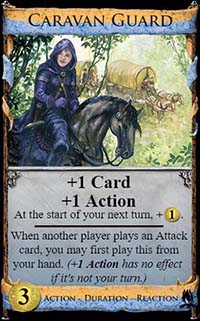
This gives you +1 Card and +1 Action when you play it, and then + at the start of your next turn after that. This card has a Reaction ability that lets you play it when another player plays an Attack card.
at the start of your next turn after that. This card has a Reaction ability that lets you play it when another player plays an Attack card.
Playing this during another player's turn is similar to playing it during your own turn - you put Caravan Guard into play, get +1 Card and +1 Action, and will get + at the start of your next turn - the very next turn you take.
at the start of your next turn - the very next turn you take.
However getting +1 Action during someone else's turn does not do anything for you; it does not let you play other Action cards during that player's turn. Similarly if a token gives you + or +1 Buy during another player's turn, that still does not let you buy cards during that player's turn (although +
or +1 Buy during another player's turn, that still does not let you buy cards during that player's turn (although + can cancel the -
can cancel the - token given out by Bridge Troll).
token given out by Bridge Troll).
The +1 Action (or potential other +'s) does not carry over to your next turn either. After reacting with a Caravan Guard, you can use another one, even one you just drew, and also can use other Reactions, even ones you just drew; you keep going until you have no more Reactions you wish to respond to the Attack with.
Coin Of The Realm
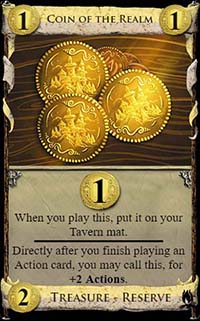
This is a Treasure worth  . You play it in your Buy phase, like other Treasures. When you play it, it goes on your Tavern mat. It produces
. You play it in your Buy phase, like other Treasures. When you play it, it goes on your Tavern mat. It produces  that turn but is no longer in play. It stays on the mat until you call it. You can call it after resolving playing an Action card, for +2 Actions (which will let you play further Action cards). Move the Coin of the Realm into play when you call it, but it does not give you
that turn but is no longer in play. It stays on the mat until you call it. You can call it after resolving playing an Action card, for +2 Actions (which will let you play further Action cards). Move the Coin of the Realm into play when you call it, but it does not give you  that turn, it just gives +2 Actions. It is discarded that turn with your other cards in play.
that turn, it just gives +2 Actions. It is discarded that turn with your other cards in play.
Distant Lands
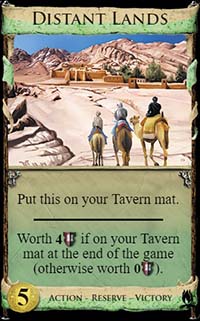
This is a Victory card. Use 8 for games with 2 players, or 12 for games with 3 or more players. This is also an Action card; when you play it, you put it on your Tavern mat. It will stay there the rest of the game; there is no way to call it.
At the end of the game, Distant Lands is worth 4  if it is on your mat, or 0
if it is on your mat, or 0  if it is not. It counts as part of your deck either way (for example it can contribute to how many
if it is not. It counts as part of your deck either way (for example it can contribute to how many  a Gardens is worth).
a Gardens is worth).
Dungeon
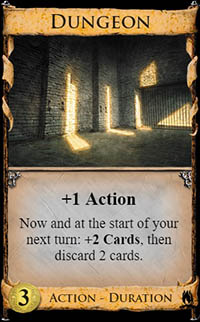
When you play this, you get +1 Action, draw 2 cards, and discard 2 cards; then at the start of your next turn, you again draw 2 cards and discard 2 cards.
Duplicate
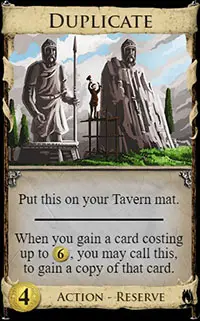
When you play this, you put it on your Tavern mat. It stays on your mat until you call it. You can call it when gaining a card costing up to  , and gain another copy of that card.
, and gain another copy of that card.
The gained card comes from the Supply and is put into your discard pile; Duplicate cannot gain non-supply cards such as Teacher. Duplicate can be called during other players' turns when you gain cards; for example, another player might buy Messenger and choose to have each player gain an Estate, and you could Duplicate that Estate.
You can call multiple Duplicates to gain multiple copies of the same card. Duplicate is discarded during the Clean-up of the turn you call it, whether or not it is your turn.
Gear

You may set aside zero, one, or two cards from your hand. Put them face down under the Gear; you may look at them. They do not have to be cards you drew with Gear.
If you set aside zero cards, Gear will be discarded the same turn you played it; if you set aside one or two cards, you put them into your hand at the start of your next turn, and Gear is discarded at the end of that turn.
Giant

At the start of the game, place your Journey token (the one with the boot) face up. When you play this, you turn the Journey token over. Then, if it is face down, you get + and nothing more happens. If it is face up, you get +
and nothing more happens. If it is face up, you get + and the attack part happens. The attack resolves in turn order, starting with the player to your left.
and the attack part happens. The attack resolves in turn order, starting with the player to your left.
The player reveals the top card of his deck, and either trashes it if it costs from  to
to  , or discards it and gains a Curse otherwise. Cards with
, or discards it and gains a Curse otherwise. Cards with  in the cost (from Alchemy) do not cost from
in the cost (from Alchemy) do not cost from  to
to  .
.
Cards with an asterisk or + by the cost that cost from  to
to  (such as Teacher, or Masterpiece from Guilds) do get trashed. Players can respond to Giant being played with Reactions that respond to Attacks (such as Caravan Guard), even if Giant will only be producing + this time.
(such as Teacher, or Masterpiece from Guilds) do get trashed. Players can respond to Giant being played with Reactions that respond to Attacks (such as Caravan Guard), even if Giant will only be producing + this time.
Guide

When you play this, you get +1 Card and +1 Action, and put it on your Tavern mat. It stays on your mat until you call it at the start of one of your turns.
If multiple things can happen at the start of your turn, you can do them in any order. When you call Guide, it moves from the mat into play, and you discard your hand, then draw 5 cards. You discard it that turn with your other cards in play.
Haunted Woods
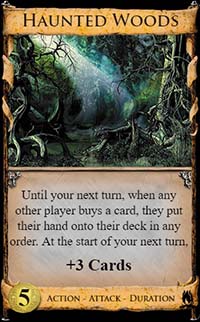
Playing this sets up two effects for the future: you will draw 3 cards at the start of your next turn; and until then, other players will put the rest of their hand on their deck whenever they buy a card.
A player may not have any cards left in hand when buying a card; typically cards left in hand will include Victory cards, Curses, and unplayed Actions. A player may intentionally avoid playing Treasures and Actions in order to take advantage of having to put his hand on his deck. Players who do not buy any cards can discard their hand normally.
Buying Events is not buying cards and so does not trigger this. If you play Haunted Woods and then take an extra turn immediately, such as with Mission or Outpost (from Seaside), you will draw the 3 cards at the start of that turn and discard Haunted Woods that turn, and other players will never be affected by it. If you want to use a Reaction card like Moat against Haunted Woods, you have to use it right when Haunted Woods is played.
Hireling
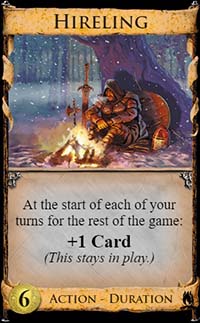
After playing this, you draw an extra card at the start of each of your turns for the rest of the game. Hireling stays in play for the rest of the game to track this. If you use Disciple (or a similar card, like Throne Room) to play Hireling twice, you will draw two extra cards each turn, and Disciple will also stay in play for the rest of the game.
Lost City
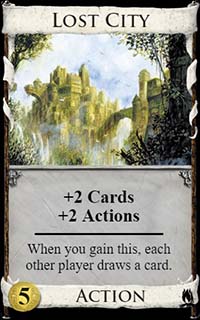
When you gain this, each other player draws a card. This applies whether you bought it or gained it some other way.
Magpie
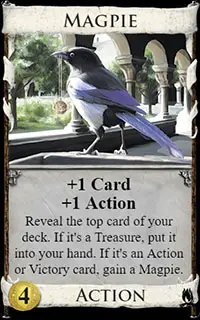
If the top card of your deck is a Treasure, it goes into your hand. If the card is not a Treasure, leave it on top of your deck. If the card is an Action card or Victory card, you gain a Magpie; once the Magpie pile is empty, revealing an Action or Victory card will not get you anything. If you reveal a Harem (from Intrigue), you both put it into your hand and gain a Magpie, since it is both a Treasure and a Victory card.
Messenger
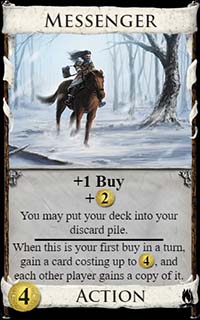
When you play this, you get +1 Buy, + , and may optionally put your deck into your discard pile. This is not discarding cards and does not trigger Tunnel (from Hinterlands).
, and may optionally put your deck into your discard pile. This is not discarding cards and does not trigger Tunnel (from Hinterlands).
When you buy Messenger, if it is the first thing you bought that turn (card or Event), you gain a card costing up to  from the Supply, putting it into your discard pile, and then each other player in turn order also gains a copy of that card. If the Supply runs out of copies of the card, further players do not get anything.
from the Supply, putting it into your discard pile, and then each other player in turn order also gains a copy of that card. If the Supply runs out of copies of the card, further players do not get anything.
Miser
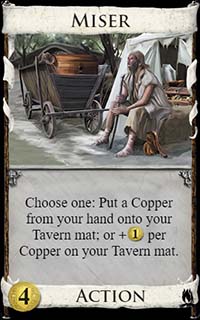
You may choose to put a Copper from your hand on your mat even if you have no Coppers in hand; nothing will happen. You may also choose to get + per Copper on your mat if there are no Coppers on your mat; nothing will happen.
per Copper on your mat if there are no Coppers on your mat; nothing will happen.
Putting a Copper from your hand on your mat is not trashing it; Coppers on your mat are not in play, but count as part of your deck when scoring at the end.
Page

See the section on Travellers. When you play Page, you get +1 Card and +1 Action. When you discard it from play, you may return it to its pile and take a Treasure Hunter, putting it into your discard pile.
Peasant
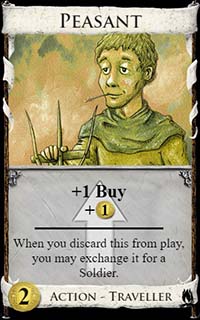
See the section on Travellers. When you play Peasant, you get +1 Buy and + . When you discard it from play, you may return it to its pile and take a Soldier, putting it into your discard pile.
. When you discard it from play, you may return it to its pile and take a Soldier, putting it into your discard pile.
Port

When you buy a Port, you gain another Port. If you gain a Port some other way, you do not get an extra Port. There are 12 Ports in the pile; use all 12.
Ranger
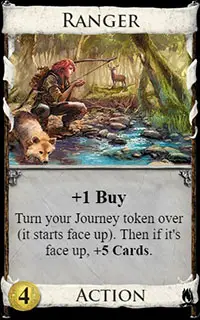
At the start of the game, place your Journey token (the one with the boot) face up. When you play this, you get +1 Buy, and turn the token over. Then if it is face down, nothing more happens. If it is face up, you draw 5 cards.
So, every other time you play a Ranger, you will draw 5 cards. It does not matter what turned over the Journey token; you could turn it face down with Giant, then face up with Ranger.
Ratcatcher
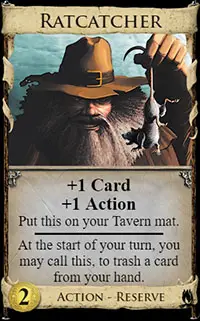
When you play this, you get +1 Card and +1 Action, and put it on your Tavern mat. It stays on your mat until you call it at the start of one of your turns. If multiple things can happen at the start of your turn, you can do them in any order.
When you call Ratcatcher, you move it from the mat into play, and you trash a card from your hand. Ratcatcher is discarded that turn with your other cards in play.
Raze
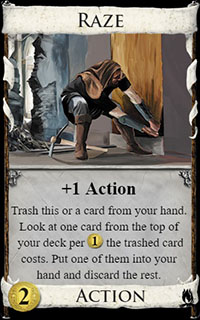
If you trash a card costing  with this, you do not get any cards. If you trash a card costing
with this, you do not get any cards. If you trash a card costing  or more, you look at a number of cards from the top of your deck equal to the cost in
or more, you look at a number of cards from the top of your deck equal to the cost in  of the trashed card, take one into your hand, and discard the rest.
of the trashed card, take one into your hand, and discard the rest.
For example if you trash an Estate, you look at the top two cards of your deck, put one into your hand, and discard the other one. You can trash the Raze itself; normally it costs  , so you would look at two cards.
, so you would look at two cards.
Costs may be affected by cards like Bridge Troll. Raze is unaffected by the -1 Card token; if it is on top of your deck, replace it after resolving Raze.
Relic
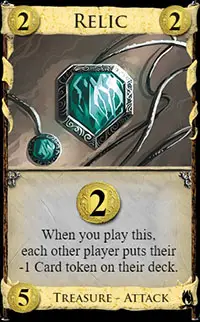
This is a Treasure worth  . You play it in your Buy phase, like other Treasures. When you play it, you also make each other player put his -1 Card token on his deck, which will cause those players to draw one less card the next time they draw cards; see the Tokens section.
. You play it in your Buy phase, like other Treasures. When you play it, you also make each other player put his -1 Card token on his deck, which will cause those players to draw one less card the next time they draw cards; see the Tokens section.
Relic is an Attack despite not being an Action; it can be blocked with Moat and responded to with Caravan Guard and so on. A player responding to Relic with Caravan Guard first plays Caravan Guard, including drawing a card, and then puts his -1 Card token on his deck.
Royal Carriage
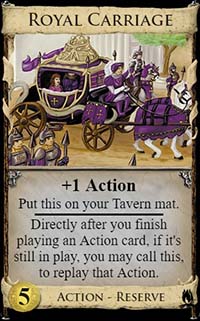
When you play this, you get +1 Action and put it on your Tavern mat. It stays on your mat until you call it, directly after resolving a played Action card that is still in play.
Royal Carriage cannot respond to Actions that are no longer in play, such as a Reserve card that was put on the Tavern mat, or a card that trashed itself (like a Raze used to trash itself). When called, Royal Carriage causes you to replay the card you just played.
You can call multiple Royal Carriages to replay the same Action multiple times (provided the Action is still in play). You completely resolve the Action before deciding whether or not to use Royal Carriage on it.
If you use Royal Carriage to replay a Duration card, Royal Carriage will stay in play until the Duration card is discarded from play, to track the fact that the Duration card has been played twice.
Storyteller
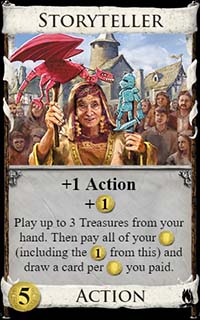
This lets you play Treasures in your Action phase. They go into play and produce coin, just like Treasures played in the Buy phase. Then Storyteller turns all of your coin into +Cards; for each  you have you lose the
you have you lose the  and get +1 Card. For example if you had
and get +1 Card. For example if you had  , you lose the
, you lose the  and draw 4 cards.
and draw 4 cards.
This makes you lose all coints you have so far that turn, including the coints you get from playing the Treasures, the + Storyteller gives you directly, and any coints you made earlier in the turn.
Storyteller gives you directly, and any coints you made earlier in the turn.
You can track that the Treasures have been "spent" by putting them under the Storyteller.  , produced by Potions from Alchemy, is not coin and so is not lost and does not get you any cards.
, produced by Potions from Alchemy, is not coin and so is not lost and does not get you any cards.
Swamp Hag
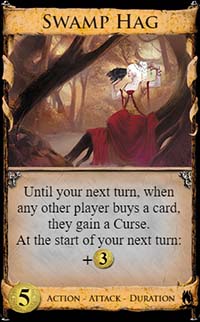
Playing this sets up two effects for the future: you will get + at the start of your next turn; and until then, other players will gain a Curse whenever they buy a Card.
at the start of your next turn; and until then, other players will gain a Curse whenever they buy a Card.
Players who buy multiple cards will gain a Curse per card bought; players who do not buy any cards will not get any Curses. This is cumulative; if you play two Swamp Hags, and the player after you plays one, then the player after that will get three Curses with any card bought.
his does not affect cards gained other ways, only bought cards. Buying Events is not buying cards and so does not trigger this. If you play Swamp Hag and then take an extra turn immediately, such as with Mission or Outpost (from Seaside), you will get + at the start of that turn and discard Swamp Hag that turn, and other players will never be affected by it. If you want to use a Reaction card like Moat against Swamp Hag, you have to use it right when Swamp Hag is played.
at the start of that turn and discard Swamp Hag that turn, and other players will never be affected by it. If you want to use a Reaction card like Moat against Swamp Hag, you have to use it right when Swamp Hag is played.
Transmogrify
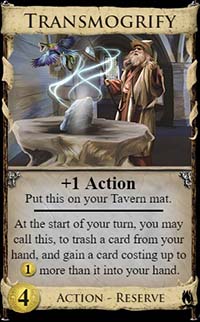
When you play this, you get +1 Action and put it on your Tavern mat. It stays on your mat until you call it, at the start of one of your turns. If multiple things can happen at the start of your turn, you can do them in any order.
When you call Transmogrify, it moves from the mat into play, and you trash a card from your hand, then gain a card costing up to  more than the trashed card. The gained card comes from the Supply and is put into your hand; if you had no cards to trash, you do not gain one.
more than the trashed card. The gained card comes from the Supply and is put into your hand; if you had no cards to trash, you do not gain one.
Transmogrify is discarded that turn with your other cards in play. You may trash a card to gain a card costing  more, or the same amount, or less; you may trash a card to gain a copy of the same card.
more, or the same amount, or less; you may trash a card to gain a copy of the same card.
Treasure Trove
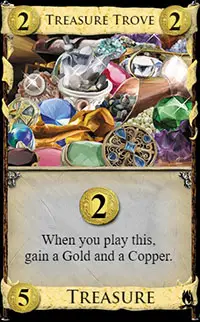
This is a Treasure worth  . You play it in your Buy phase, like other Treasures. When you play it, you gain a Copper and a Gold from the Supply, putting them into your discard pile. If one of those piles is empty, you still gain the other card.
. You play it in your Buy phase, like other Treasures. When you play it, you gain a Copper and a Gold from the Supply, putting them into your discard pile. If one of those piles is empty, you still gain the other card.
Wine Merchant
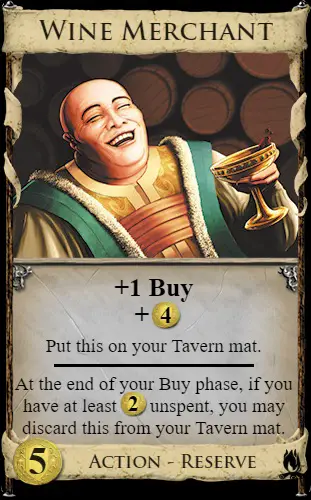
When you play this, you get +1 Buy and + , and put it on your Tavern mat. It stays on your mat until the end of one of your Buy phases in which you have
, and put it on your Tavern mat. It stays on your mat until the end of one of your Buy phases in which you have  or more that you didn't spend.
or more that you didn't spend.
At that point you can discard Wine Merchant from your mat. If you have multiple Wine Merchants on your mat, you don't need  per Wine Merchant, just
per Wine Merchant, just  total.
total.
Continue Reading
